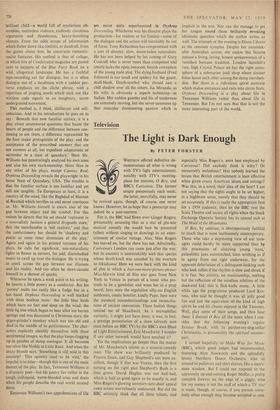Television
The Light is Dark Enough
By PETER FORSTER For it, the BBC had flown over Ginger Rogers, presumably assuming that as a star of pre-war musical comedy she would best be presented (albeit without singing or dancing) in an enter- tainment of similar vintage. Alas, Miss Rogers has moved on, but the show has not. Admittedly, Carissima's London run came just after the war, but its ancestry is unmistakably with that species whose death-knell was sounded by the overture to Oklahoma! Here we were back with the kind of plot in which a Just-one-more-picture-please- Miss-Marvin kind of film star goes from New York to Venice in pursuit of a tenor who pre- tends to be a gondolier and woos her in a prop beard; here were the regulation silly-ass English nobleman, comic hotelier, kindly Papa; here were the standard misunderstandings and reconcilia- tions of ancient convention. These foolish things remind me of Maschwitz. As a necrophiliac curiosity, it might just have done; it was, in fact, a prestige presentation of a show (already seen once before on BBC TV) by the BBC's own Head of Light Entertainment, Eric Maschwitz. I wonder if any other network would have touched it?
Yet the implications go deeper than the matter of Mr. Maschwitz's talents as a musical-comedy man. The show was brilliantly produced by Francis Essex, and Guy Shepherd's sets were ex- cellent, though if that was Venice, then the first turning on the right past Shepherd's Bush is a lime grove. David Hughes was not half-bad, which is half as good again as he usually is, and Miss Rogers's glowing secretary-next-door appeal came across marvellously undimmed. But did the BBC seriously think that all these talents, and especially Miss Rogers's, were best employed by CarivAima? Did anybody think it witty? Or memorably melodious? Has nobody learned the lesson that British entertainment is least effective when given ersatz American idiom and settings? Was this, in a word, their idea of the best? 1 am not saying that the sights ought to be set higher, in a highbrow sense, merely that they should be set accurately. if this is really the appropriate fare for a 1959 audience, then let the BBC rent the Scala Theatre and secure all rights when the Stock Exchange Operatic Society has its annual stab at The Maid of the Mountains.
0 Boy, by contrast, is obstreperously faithful to much that is most loathsomely contemporary. Those who take a depressing view of our teen- agers could hardly be more supported than by this procession of ululating young 'stars,' pakeolithic jaws outstretched, loins writhing as if in agony from too tight underwear, for the apparent delectation of a delinquent-looking mob who look sullen if the rhythm is slow and shriek if it is fast. No artistry, no musicianship, nothing but the reflection of the mindless nihilism of the dead-end kid; this is flick-knife music. A little while ago the programme produced Lord Kin- ross, who said he thought it was all jolly good fun and just the equivalent o1 the kind of high spirits he and his chums enjoyed in the Twenties. Well, play some of their songs, and then hear these. I distrust 0 Boy all the more when I con- sider that the following evening's regular Sunday Break, with its pardon-my-dog-collar Christianity, is presumably the spiritual counter- part.
I turned hopefully to Make Way for Music (BBC), which good judges had recommended, featuring Alyn Ainsworth and the splendidly brassy Northern Dance Orchestra, who sit around in pullovers and shirt sleeves, like a men's- store window. But I could not respond to the apparently up-and-coming Roger Moffat, a pretty compere forever on the edge of a giggle, who for my money is not the stuff of which a TV star is made, though, of course, if you present some- body often enough they become accepted as one.






































 Previous page
Previous page